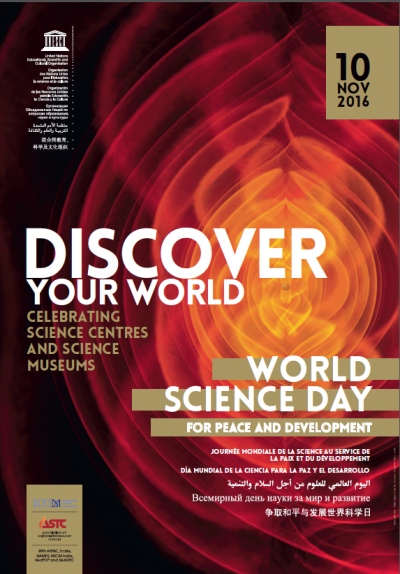


Message from Ms Irina Bokova, Director-General of UNESCO, on the occasion of the World Science Day for Peace and Development, 10 November 2016
The 2016 World Science Day for Peace and Development is dedicated to the theme “Celebrating Science Centres and Science Museums”.
Our starting point is clear. Science stands at the heart of the 2030 Agenda for Sustainable Development, the Addis Ababa Action Agenda, the Sendai Framework for Action, and the Paris Agreement on Climate Change. These agreements embody a new vision for prosperity, peace and the planet, to allow every society to create and share knowledge, to nurture every source of innovation and creativity, to craft a more inclusive, sustainable and just path to the future. Taking this forward calls for an ever greater expansion of science and for tighter linkages between science and society.
This is why science centres and museums are so important -- for capacity building, for advocacy, to send strong messages about the importance of science for sustainable development.
Science centres and museums plays key roles in nurturing the curiosity of women and men, as living laboratories of creativity, catalysing research and solutions to help societies meet challenges. In the digital era, when we need innovative initiatives to promote the learning of science outside the classrooms, museums and science centres are privileged places of education. They provide excellent ways to encourage children, especially girls, to pursue careers in science – to multiply our collective scientific capabilities.
In November 2015, UNESCO adopted a global Recommendation on the Protection and Promotion of Museums and their Collections, their Diversity and their Role in Society, strengthening our commitment to mobilize museums as key actors of peace and sustainable development.
This year, in the celebration of World Science Day for Peace and Development, we take this forward with the Association of Science-Technology Centres and the International Council of Museums, to nurture and share science knowledge.
Science museums and centres are platforms for dialogue, understanding and resilience. They produce sparks of delight and wonder that inspire all visitors, regardless of age and background, in an experience that brings all women and men together around common values.
In this spirit, I invite all of partners and governments to do everything to support, nurture and harness the full power of science museums and centres to shape a more inclusive and sustainable future for all.